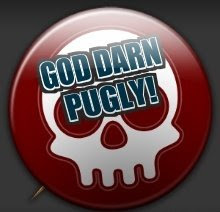
It was morning when it happened.
I was about to go to work and was dressing up when suddenly, my right hand felt numb.
Of course all I thought was it was the normal kind of numbness you feel when you've put too much pressure on your hands for too long.
Boy was I wrong.
I shook my hand for about a minute, and still tried putting on my bra. I couldn't control my fingers because they were shaking so badly.
After a couple of minutes, the numbness in my right hand disappeared.
Then, I thought there was hair in my mouth. But no, it seems the right side of my tongue began being numb too!
Then the right side of my chin became to get numb.
Still, at age 25 you wouldn't think this was stroke right?
WRONG!
My mother felt I should go to the hospital when I tried speaking to her and all I got out was a lot of slurring.
We got to the Medical City (a hospital near us) about 3 hours later (mainly due to the immense traffic jam that morning).
Doctors were astounded at my symptoms.. they wouldn't believe someone as young as I was would be having a stroke.
But I did. And it was fortunate that I got the right treatment in time.
After about a day in the Intensive Care Unit, I regained half the strength of my facial muscles there was still a little bit of slowed speech but after 4 days I recovered completely.
Now, I'm on a blood thinning medication called "Cilostazol" since I got allergic from my prior blood thinner called "Clopidogrel" AND "Lipitor" to lower my cholesterol.
These medicines help me to NOT have stroke again, and will probably be taking blood thinners for a very long time.
WHAT IS STROKE?
According to http://www.stroke.org/, a stroke or "brain attack" occurs when a blood clot blocks an artery (a blood vessel that carries blood from the heart to the body) or a blood vessel (a tube through which the blood moves through the body) breaks, interrupting blood flow to an area of the brain. When either of these things happen, brain cells begin to die and brain damage occurs.
When brain cells die during a stroke, abilities controlled by that area of the brain are lost. These abilities include speech, movement and memory.
In my research, I began to see that Stroke is like having a heart attack in your brain. If the clot occurs in your heart, it's a heart attack. If it's in your brain, it's a stroke.
They called mine "Stroke in the Young".
Contrary to what many believe, stroke is not that rare in people younger than 40 years.
In fact, I found out that my neurosurgeon was also treating a 3 year old who had a stroke.
Stroke Warning Signs:
If you notice one or more of these signs, don't wait.
Stroke is a medical emergency. Get to a hospital right away!
Sudden numbness or weakness of the face, arm or leg,
especially on one side of the body
Sudden confusion, trouble speaking or understanding
Sudden trouble seeing in one or both eyes
Sudden trouble walking, dizziness, loss of balance or coordination
Sudden, severe headache with no known cause
Be prepared for an emergency. Keep a list of emergency rescue service numbers next to the telephone and in your pocket, wallet or purse. Find out which area hospitals are primary stroke centers that have 24-hour emergency stroke care. Know (in advance) which hospital or medical facility is nearest your home or office.
Take action in an emergency. Not all the warning signs occur in every stroke. Don't ignore signs of stroke, even if they go away! Check the time. When did the first warning sign or symptom start? You'll be asked this important question later.
If you have one or more stroke symptoms that last more than a few minutes, don't delay!
If you're with someone who may be having stroke symptoms, expect the person to protest —denial is common. Don't take "no" for an answer. Insist on taking prompt action.
ARE YOU AT RISK???
 Uncontrollable Risk Factors:
Uncontrollable Risk Factors:- Age
- Gender
- Race
- Family History
- Previous Stroke or TIA (Transient Ischemic Attack)
Controllable Risk Factors:
- High Blood Pressure (Hypertension)
- Atrial Fibrillation or AF (irregular heart beat - can be prevented with proper treatment)
- High Cholesterol
- Diabetes
- Smoking
- Alcohol Consumption
- Obesity / Excessive Weight
I never had hypertension, nor AF nor Diabetes nor did I drink. BUT, I was a smoker; I had high cholesterol and I was overweight.
My doctors never did find out why I had a stroke. They tried to minimize the possibility of a recurrence by putting me off Oral Conceptive Pills and smoking with proper healthy diet.






No comments:
Post a Comment